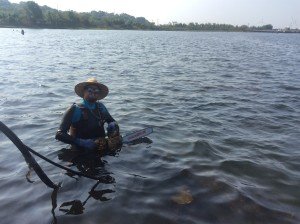
When I became captain of an 80-foot sailing schooner roughly one year ago, I really didn’t want too much more out of life. To spend day after day sailing, and to have that actually be my job, seemed about all anyone’s heart could desire, employment-wise. Of course the position has its difficulties: dealing with still-unseamanlike crew early in the season; dealing with 250 tourists a day all season; the frightful boat traffic on weekends, especially the clueless racing sailors who always seem determined to crush themselves to flinders under the schooner’s inexorable steel bows. Still, all those things are manageable, and I would have happily continued in that employment until I died from old age at the wheel. But another unfortunate feature of “headboats”—that is, boats that count by the head—is that they choose, against all reason and decency, to operate seven days a week. When I asked to be allowed Sundays off, with any combination of the other six days at their disposal, I was firmly invited to hit the road.
My first choice for an alternate job was, of course, what I’ve always wanted: a cushy cubicle in a climate-controlled building, with my very own rolly chair on a plastic mat, a mug full of pencils, and maybe even a stapler (a stapler! Imagine…). Surprisingly, those sorts of jobs are hard to find—as much as folk pretend to complain of them, they’re pretty unavailable, which makes me think that everyone really wants them after all. The only place that even wrote me a second email was all hung up on wanting to see a College Degree. Of course I have no such thing, being a mostly illiterate seafaring man, so I was faced with finding something else in the maritime line.

As so often happens, a rather surprising thing cropped up at just the right time: Clean the Bay, a nonprofit organization that removes heavy debris from shorelines, needed a full-time captain for their Landing, Staging and Transport craft, or ‘LST’. Though these come in all sizes, and played a major role in the Normandy Invasion, the one I’m now driving is rather un-grandiose, being on the smaller side, and not big enough to transport a Volkswagen, never mind even the smallest army tank. But it will cruise at 25 knots, and does what we do most excellently. And what we do, primarily, is run it aground on a beach, drop the front gate down, and gather up all the man-made flotsam. Much of it is timber—old ship’s keels, broken-up piers, creosoted railroad ties, things like that. Most of the pieces are too big to carry, and must be cut into smaller bits with chainsaws before being loaded aboard the LST.

Now, when I began my seafaring career, I would never have imagined myself at the helm of a garbage barge, leaping ashore with chainsaws and timber spikes to wrestle huge beams into submission, but I confess I’m finding it pretty satisfactory. In a way, I’m a professional beachcomber, which is something I wanted to do long before I even knew about office jobs with paper clip organizers and rubber band balls.



But in case even beachcombing loses it’s thrill, we have a secondary objective—two derelict barges that were allowed to sink on a shoal that has been used as a boat graveyard for almost a hundred years. Last years’ crew managed to cut them down to the low water mark, but now we must get into the water and cut the waterlogged yellow pine timbers largely by feel into pieces small enough to pull aboard. Of course a regular chainsaw won’t work submerged, so we’ve secured a hydraulic one, meant for underwater demolition. Again, I have to admit that even five weeks ago such a thing would never have occurred to me—not only would I never have dreamed that hydraulic chainsaws existed, but that I’d be working the business end of one while standing chest-deep in the Providence River. But life’s full of surprises, from the small shocks one gets as cold water begins to trickle under the nooks and crannies of one’s wetsuit, to the astonishment at realizing that he’s being paid to explore sun-drenched, lonely beaches. Some folk spend most of their lives combing beaches, looking for treasure they’ll never find. If we never find anything but tires, timber, and styrofoam, we can know that one real treasure—the coastline we just cleaned—is prettier, safer, and more natural because we happened by. It’s a good job to have.